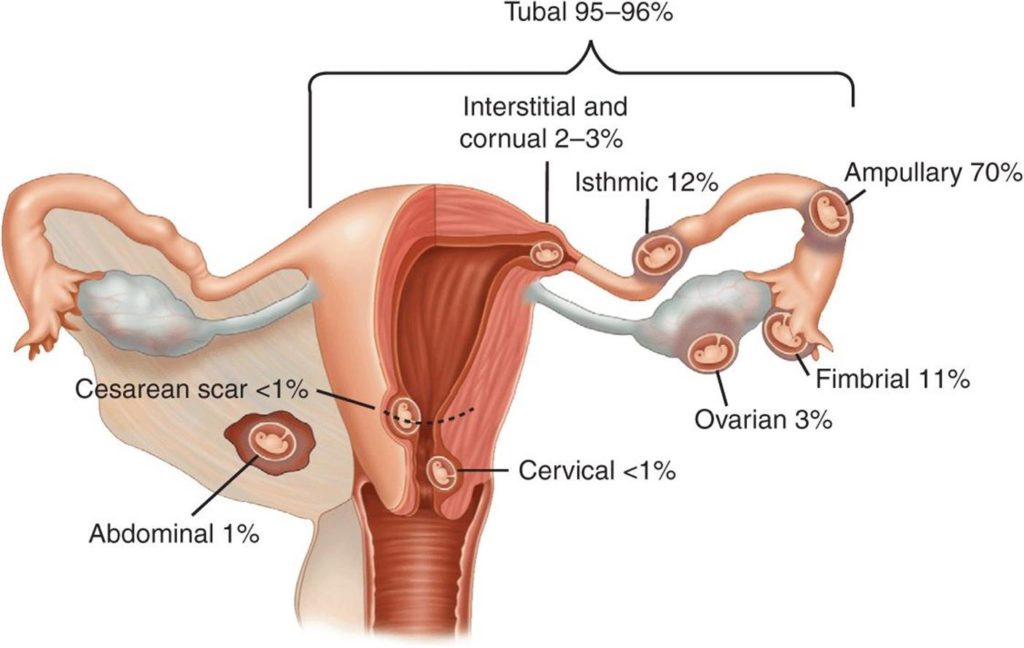Ruptured ectopic pregnancy
Emergency surgery is needed if a Fallopian tube splits (ruptures) with heavy bleeding. The main aim is to stop the bleeding. The ruptured Fallopian tube and remnant of the early pregnancy are then removed. The operation is often life saving.
Early ectopic pregnancy – before rupture
Ectopic pregnancy is most often diagnosed before rupture. Your doctor will discuss the treatment options with you and, in many cases, you are able to decide which treatment is best for you. These may include the following:
Surgery.
Removal of the tube (either the whole tube or part of it) and the ectopic pregnancy is most commonly performed by keyhole surgery (a laparoscopic operation). Removal of the Fallopian tube containing the ectopic pregnancy (salpingectomy) is usually performed if the other tube is healthy. Removal of only a section of the tube with the ectopic pregnancy in it (salpingotomy) is usually performed if the other tube is already damaged.
Medical treatment.
Medical treatment of ectopic pregnancies is now an option in many cases and avoids the need for surgery.
A medicine called methotrexate is often given, usually as an injection. It works by killing the cells of the pregnancy growing in the Fallopian tube. It is normally only advised if the pregnancy is very early. The advantage is that you do not need an
operation. The disadvantage is that you will need close observation for several weeks with repeated blood tests and scans to check it has worked. You will need to have a blood test for hCG every 2-3 days until your levels are low. Scans are usually repeated weekly. Methotrexate can cause side-effects which include feeling sick (nausea) and being sick (vomiting) in some women. It can be common for some tummy (abdominal) pains to develop 3-7 days after having methotrexate.
Wait and see.
Not all ectopic pregnancies are life-threatening or lead to a risk to the mother. In many cases the ectopic pregnancy resolves by itself with no future problems. The pregnancy often dies in a way similar to a miscarriage. A possible
option is to see how things go if you have mild or no symptoms. You would need to have treatment if symptoms become worse. You will need close observation by your gynaecologist and repeated scans and blood tests to check on how things are developing.
If your blood group is rhesus negative then you will need an injection of anti-D immunoglobulin if you have an operation for your ectopic pregnancy or if you have had a lot of bleeding. You are rhesus positive if you have the rhesus factor, which is a protein on the surface of your red blood cells. If the protein is not present, you are rhesus negative. All pregnant women have a blood test
to determine whether they are rhesus positive or negative. The injection of anti-D immunoglobulin simply prevents you from producing antibodies, which can be harmful in future pregnancies, if you are rhesus negative. You do not need this injection though if you receive medical treatment.
The above is a brief description of treatment options. A gynaecologist will advise on the pros and cons of each treatment with you. This will include any complications or side-effects which could occur with each option.
What if I have a pregnancy in the womb at the same

time as an ectopic pregnancy?
This is called a heterotopic pregnancy and is unusual. It is more common if you have become pregnant with in vitro fertilization (IVF) treatment. If the pregnancy in the womb is healthy and developing normally then it will not be possible to have methotrexate treatment. This is because it would damage the baby in the right place as well as the tissue growing in the wrong place. You may need an operation or injection to remove or destroy the pregnancy in the wrong place, so that the normal pregnancy can continue safely. In some cases no treatment is needed, and the pregnancy in the wrong place will resolve itself,
leaving you only with the normal pregnancy. Again, your specialist will advise you.
Are there any complications of ectopic pregnancy?
In the now uncommon event of the ectopic pregnancy rupturing, there may be severe consequences. Heavy bleeding can cause
serious medical problems and, occasionally, even death. However, most women nowadays are diagnosed in the early stages,
before this happens. In this scenario, most women recover very well. There are some rare complications after surgery, which
your gynaecologist would discuss with you before the operation. As discussed, there are often some side-effects from taking the medical treatment option.
Women often want to know if they will be able to have a normal pregnancy in the future after an ectopic pregnancy. If you had no past history of problems conceiving or diseases involving your Fallopian tubes before your ectopic pregnancy, your fertility will not be affected and you should have no more chance of having an ectopic pregnancy than a woman who has not had an
ectopic pregnancy. If you had one of the risk factors above, however, you may be more at risk of problems in the future. If you had to have an operation, you are more likely to have fertility problems and problems with future ectopic pregnancies than if you had medical treatment or no treatment was needed. Even if one Fallopian tube is completely removed, you have about a 6 in 10 chance of having a future normal pregnancy. (The other Fallopian tube will still usually work.) However, 1-2 in 10 future pregnancies may lead to another ectopic pregnancy. It is therefore important that if you have had an ectopic pregnancy in the past you should go to see your doctor early in future pregnancies.
It is common to feel anxious or depressed for a while after treatment. Worries about possible future ectopic pregnancy, the effect on fertility, and sadness over the loss of the pregnancy are normal. Do talk with a doctor about these and any other concerns following treatment.
SUMMARY
Ectopic pregnancy is common. The pregnancy never survives.
The typical _rst symptom is pain in the lower tummy (abdomen) after a recent missed period.
As the pregnancy grows it may tear (rupture) the Fallopian tube, requiring emergency surgery.
Planned treatment before rupture occurs is best.
Many women with ectopic pregnancies do not need surgery

